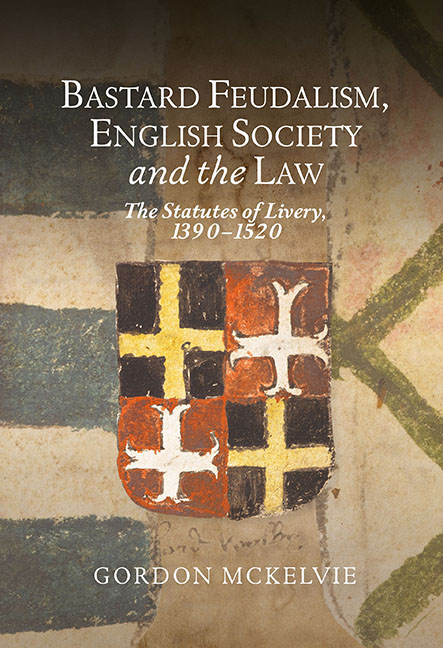Book contents
- Frontmatter
- Contents
- Acknowledgements
- Abbreviations
- Timeline of Parliamentary Activity
- Introduction
- Chapter 1 The System – Liveries and Retaining
- Chapter 2 The Early Years, 1390 to 1449
- Chapter 3 The Later Years, 1449 to 1520
- Chapter 4 Outcomes and Enforcement
- Chapter 5 The Identity of the Indicted
- Chapter 6 The Geography of the Cases
- Chapter 7 Networks and Localities
- Chapter 8 Livery and Disorder
- Chapter 9 The Urban Experience
- Conclusion
- Appendix 1 Number of Cases by Reign
- Appendix 2 Number of Cases in each County
- Appendix 3 List of Letters to Towns and Lordships
- Appendix 4 List of Local Ordinances
- Appendix 5 Letters from Henry VII to Duchy of Lancaster Officials
- Bibliography
- Index
Chapter 2 - The Early Years, 1390 to 1449
Published online by Cambridge University Press: 02 April 2020
- Frontmatter
- Contents
- Acknowledgements
- Abbreviations
- Timeline of Parliamentary Activity
- Introduction
- Chapter 1 The System – Liveries and Retaining
- Chapter 2 The Early Years, 1390 to 1449
- Chapter 3 The Later Years, 1449 to 1520
- Chapter 4 Outcomes and Enforcement
- Chapter 5 The Identity of the Indicted
- Chapter 6 The Geography of the Cases
- Chapter 7 Networks and Localities
- Chapter 8 Livery and Disorder
- Chapter 9 The Urban Experience
- Conclusion
- Appendix 1 Number of Cases by Reign
- Appendix 2 Number of Cases in each County
- Appendix 3 List of Letters to Towns and Lordships
- Appendix 4 List of Local Ordinances
- Appendix 5 Letters from Henry VII to Duchy of Lancaster Officials
- Bibliography
- Index
Summary
The initial laws restricting the distribution of liveries to certain categories for servants were the result of a campaign from the Commons to combat the problems associated with the unrestricted distribution of livery. These attempts are evident in a number of petitions presented by the Commons to several parliaments from the 1380s to the 1420s. The two recurrent themes in these petitions were the problem of lawlessness in the localities and the fact that previous statutes on the subject had not been properly enforced. This seems paradoxical as those MPs who called for a new law, those responsible for upholding the new law and those most likely to have been breaking them were all drawn from the same social rank, the gentry. The surviving evidence can help to address this apparent paradox.
The earliest evidence of concerns about the unrestricted distribution of liveries comes from petitions to the king in parliament from the Commons. The parliament rolls are a vital yet problematic source. Unlike other medieval parliaments, the late medieval English parliament was bicameral, divided between the House of Lords and the House of Commons. The parliament rolls only record decisions and events that happened in the Commons, not in the Lords. The Lords had a more informal and direct connection with the king and therefore their discussions and decisions did not need to be formally recorded. Therefore, the surviving documents may over-emphasise the importance of the Commons in making of laws. In addition, what survives is only the final official version of the parliament and normally excludes much information on parliamentary speeches, debates and processes that the records were not intended to record. The lack of parliamentary journals for the middle ages or any records of the day-to-day proceedings also means that it is difficult to gauge what was discussed and for how long. The surviving written records only provide a glimpse of what was spoken. Despite these problems, the parliament rolls are essential for understanding the decisions made by late medieval parliaments.
Enrolled on the parliament rolls are various petitions to the crown from different groups asking the king to redress their grievances.
- Type
- Chapter
- Information
- Bastard Feudalism, English Society and the LawThe Statutes of Livery, 1390–1520, pp. 33 - 56Publisher: Boydell & BrewerPrint publication year: 2020



